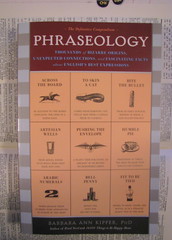I enjoy words and phrases. They contain the memory of past usage and the flavor of different cultures. Studying the origins of those words and phrases lets you peel back the modern context and reveal those earlier secrets.
 With great expectations, then, I opened a new book offered as a “definitive compendium” and an “ultimate collection of everything you never knew about the wonderful phrases found in the English language.” But even if the marketing had promised much less, Barbara Ann Kipfer’s new book, Phraseology, would not deliver.
With great expectations, then, I opened a new book offered as a “definitive compendium” and an “ultimate collection of everything you never knew about the wonderful phrases found in the English language.” But even if the marketing had promised much less, Barbara Ann Kipfer’s new book, Phraseology, would not deliver.
I was disappointed first by the sheer brevity of the entries. Cramming 7000 phrases onto 300 pages does not leave much room for detail. Most listings are only a sentence long — if you could call them sentences. (There are no periods.) This reductionism makes some entries quite comical. Picture in your mind, for instance, how abhorrent “a ‘half bath’ has a toilet and a sink” becomes by making no reference to a room.
Second, Phraseology can’t make up its mind whether its purpose is to merely define the phrase (‘Fall Classic’ is the World Series), reveal an origin (‘numero uno’ is Italian/Spanish), put something in context (the ‘Gregorian calendar’ is the one now in general use), or just say ANYthing (the gray whale is actually black). These examples are given here in their entirety, by the way.
Third, most entries lack any sense of context. It’s wonderful to learn that “teacher’s pet” originated in the 1920s, or “dirty pool” came from a movie, or a “school tuna” is 20-100 pounds. But why? Upon reading “‘keynote address’ dates to 1905,” my first thoughts were: That’s a specific date. There must have been a specific event. What event? Who used the phrase? Why ‘keynote’?
Although the author has a PhD in linguistics, she offers no sources, no bibliography, and simply not enough depth to make this a good reference volume or even a browsing book. None of my basic curiosity was satisfied. In fact, browsing the book made me yearn for an “ultimate collection of everything you never knew about the wonderful phrases found in the English language.” A few candidates exist. Phraseology was not one of them.

